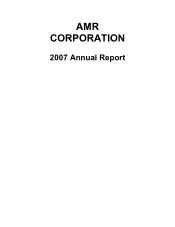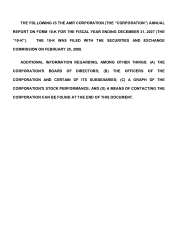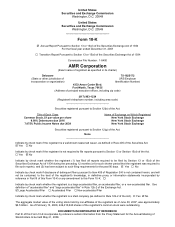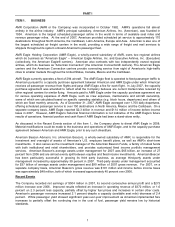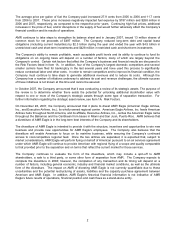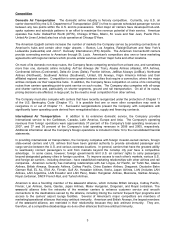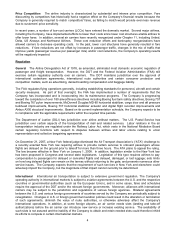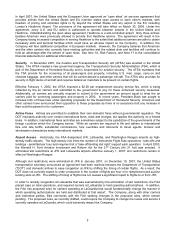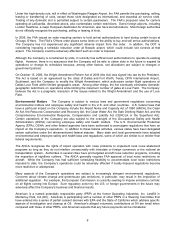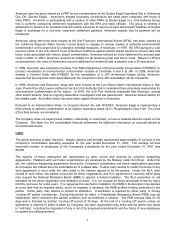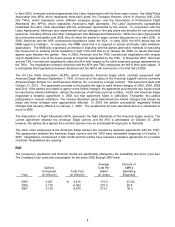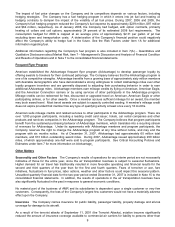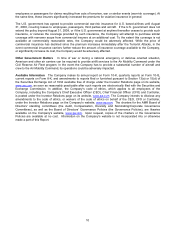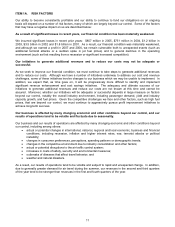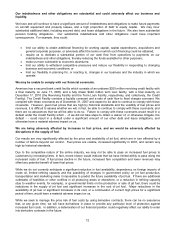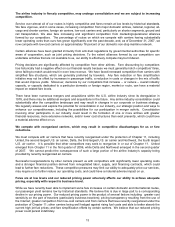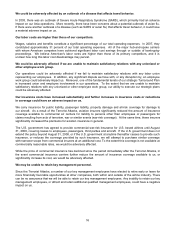American Airlines 2007 Annual Report Download - page 9
Download and view the complete annual report
Please find page 9 of the 2007 American Airlines annual report below. You can navigate through the pages in the report by either clicking on the pages listed below, or by using the keyword search tool below to find specific information within the annual report.6
Under the high-density rule, still in effect at Washington Reagan Airport, the FAA permits the purchasing, selling,
leasing or transferring of slots, except those slots designated as international, and essential air service slots.
Trading of any domestic slot is permitted subject to certain parameters. The FAA’s proposed rules for carriers
operating at LaGuardia, described above, also contemplate certain restrictions. Some foreign airports, including
London Heathrow, a major European destination for American, also have slot allocations. Most foreign authorities
do not officially recognize the purchasing, selling or leasing of slots.
In 2006, the FAA issued an order requiring carriers to hold arrival authorizations to land during certain hours at
Chicago O’Hare. The FAA’s O’Hare order places some limits on the ability to buy and sell arrival authorizations.
The Company has not experienced any significant adverse impact from this order. In addition, the DOT is
considering imposing a schedule reduction order at Newark airport, which could include slot controls at that
airport. The Company could be adversely affected if such an order is imposed.
Although the Company is constrained by slots, it currently has sufficient slot authorizations to operate its existing
flights. However, there is no assurance that the Company will be able to obtain slots in the future to expand its
operations or change its schedules because, among other factors, slot allocations are subject to changes in
government policies.
On October 13, 2006, the Wright Amendment Reform Act of 2006 (the Act) was signed into law by the President.
The Act is based on an agreement by the cities of Dallas and Fort Worth, Texas, DFW International Airport,
Southwest, and the Company to modify the Wright Amendment, which authorizes certain flight operations at
Dallas Love Field within limited geographic areas. Among other things, the Act eventually eliminates domestic
geographic restrictions on operations while limiting the maximum number of gates at Love Field. The Company
believes the Act is a pragmatic resolution of the issues related to the Wright Amendment and the use of Love
Field.
Environmental Matters The Company is subject to various laws and government regulations concerning
environmental matters and employee safety and health in the U.S. and other countries. U.S. federal laws that
have a particular impact on the Company include the Airport Noise and Capacity Act of 1990 (ANCA), the Clean
Air Act, the Resource Conservation and Recovery Act, the Clean Water Act, the Safe Drinking Water Act, and the
Comprehensive Environmental Response, Compensation and Liability Act (CERCLA or the Superfund Act).
Certain operations of the Company are also subject to the oversight of the Occupational Safety and Health
Administration (OSHA) concerning employee safety and health matters. The U.S. Environmental Protection
Agency (EPA), OSHA, and other federal agencies have been authorized to promulgate regulations that have an
impact on the Company's operations. In addition to these federal activities, various states have been delegated
certain authorities under the aforementioned federal statutes. Many state and local governments have adopted
environmental and employee safety and health laws and regulations, some of which are similar to or stricter than
federal requirements.
The ANCA recognizes the rights of airport operators with noise problems to implement local noise abatement
programs so long as they do not interfere unreasonably with interstate or foreign commerce or the national air
transportation system. Authorities in several cities have promulgated aircraft noise reduction programs, including
the imposition of nighttime curfews. The ANCA generally requires FAA approval of local noise restrictions on
aircraft. While the Company has had sufficient scheduling flexibility to accommodate local noise restrictions
imposed to date, the Company’s operations could be adversely affected if locally-imposed regulations become
more restrictive or widespread.
Many aspects of the Company’s operations are subject to increasingly stringent environmental regulations.
Concerns about climate change and greenhouse gas emissions, in particular, may result in the imposition of
additional regulation. For example, the European Commission is currently seeking to impose emissions controls
on all flights coming into Europe. Such regulatory action by the U.S. or foreign governments in the future may
adversely affect the Company’s business and financial results.
American is a named potentially responsible party (PRP) at the former Operating Industries, Inc. Landfill in
Monterrey Park, CA (OII). American is participating with a number of other PRPs in a Steering Committee that
have entered into a series of partial consent decrees with EPA and the State of California which address specific
aspects of investigation and cleanup at OII. American’s alleged volumetric contributions at OII are small when
compared with those of other PRPs, and American expects that any future payments will be immaterial.

